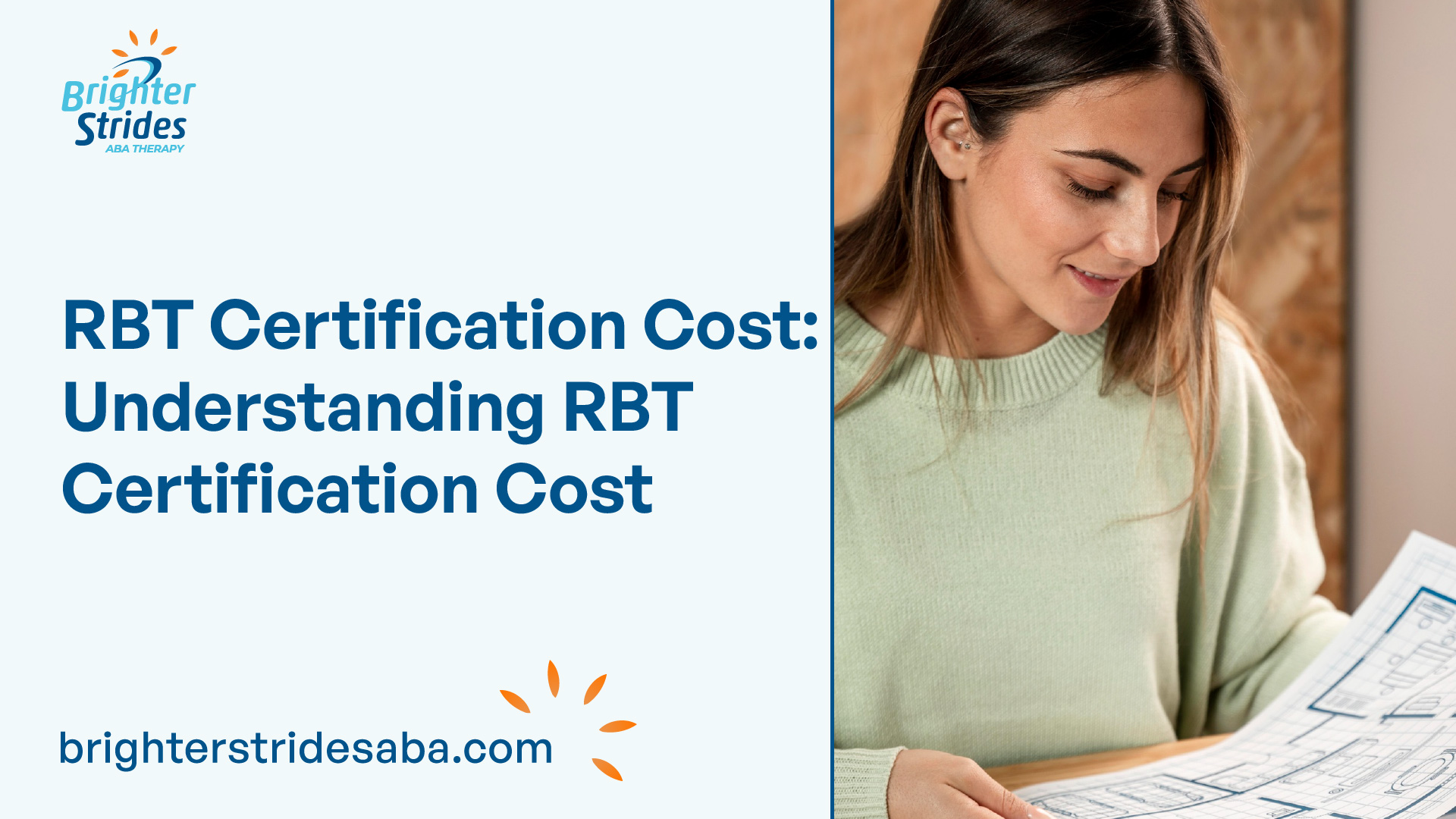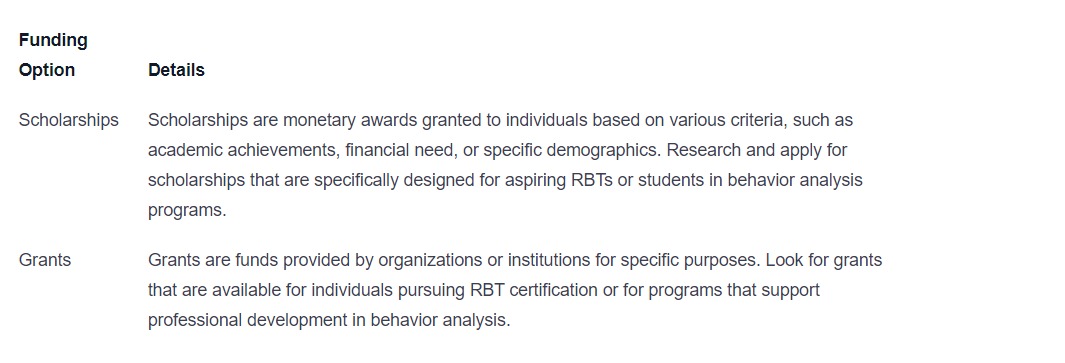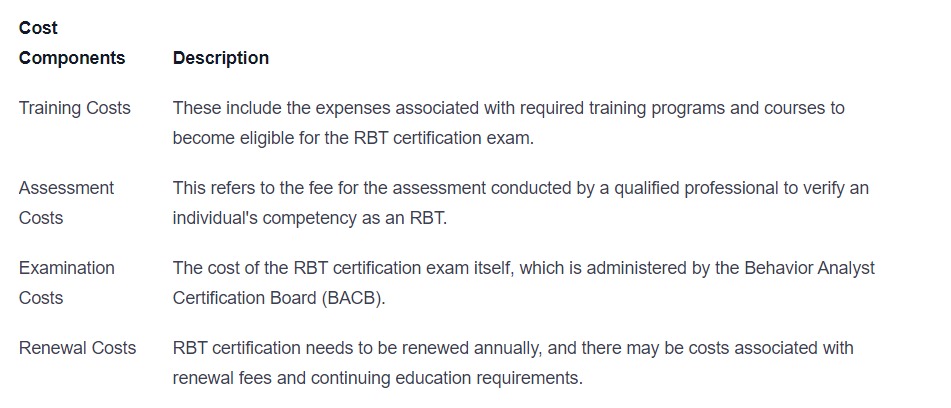The Value of RBT Certification
Introduction to Registered Behavior Technician (RBT) Certification
Registered Behavior Technician (RBT) Certification is a credential that recognizes individuals who possess the necessary skills and knowledge to provide behavior analysis services under the supervision of a Board Certified Behavior Analyst (BCBA). This certification is a valuable qualification for those interested in working in the field of Applied Behavior Analysis (ABA) and providing support to individuals with behavioral challenges.
The RBT certification is offered by the Behavior Analyst Certification Board (BACB), a globally recognized organization that establishes professional standards for behavior analysts. To obtain RBT certification, individuals must meet specific requirements, including completing a specified number of training hours, passing an assessment, and adhering to the BACB’s professional and ethical standards.

Benefits of Obtaining RBT Certification
Obtaining RBT certification offers numerous benefits for individuals pursuing a career in behavior analysis. Here are some key advantages:
- Enhanced Career Opportunities: RBT certification opens doors to a wide range of job opportunities in various settings, including schools, clinics, hospitals, and community-based organizations. As an RBT, you can work directly with individuals with autism and other developmental disabilities, helping them improve their social, communication, and behavioral skills.
- Professional Recognition: RBT certification demonstrates your commitment to professional growth and excellence in the field of behavior analysis. It signifies that you have the necessary knowledge and skills to provide effective behavior interventions under the supervision of a BCBA.
- Supervisory Support: As an RBT, you will work under the supervision of a BCBA, receiving guidance and mentorship to enhance your professional development. This ongoing supervision ensures that you are providing the highest quality of services to individuals and allows for continuous learning and improvement.
- Ethical Standards: RBT certification requires adherence to the BACB’s Professional and Ethical Compliance Code for Behavior Analysts. This code provides guidelines for ethical conduct, ensuring that RBTs prioritize the well-being and dignity of the individuals they serve.
- Personal Fulfillment: Working as an RBT allows you to make a positive impact on the lives of individuals with behavioral challenges. By helping them acquire important life skills and achieve their goals, you contribute to their overall well-being and personal growth.
Investing in RBT certification can provide a solid foundation for a rewarding and fulfilling career in behavior analysis. The certification not only validates your knowledge and skills but also opens up opportunities for professional growth and development.
Understanding RBT Certification Cost
When considering pursuing a Registered Behavior Technician (RBT) Certification, it’s essential to understand the associated costs. The cost of RBT certification can vary depending on different factors. In this section, we will provide an overview of RBT certification cost and explore the factors that affect it.
Overview of RBT Certification Cost
The cost of obtaining RBT certification typically includes several components, such as training, assessment, examination, and renewal fees. It’s important to consider all these factors when budgeting for RBT certification.
The table below provides a general overview of the average cost range for each component of RBT certification:

It’s worth noting that these cost ranges are approximate and can vary based on factors such as location, training provider, and additional study materials.
Factors Affecting the Cost of RBT Certification
Several factors can influence the cost of RBT certification. Understanding these factors can help you plan and make informed decisions about your investment in your career. Here are some key factors to consider:
- Location: The cost of RBT certification can vary depending on your geographical location. Training providers, assessment centers, and examination fees may differ from one region to another.
- Training Provider: Different organizations and institutions offer RBT training programs, and the cost can vary between providers. Factors such as the reputation of the training program, the duration of the training, and additional resources provided can influence the cost.
- Assessment and Examination Fees: The fees associated with the assessment and examination process are typically set by the Behavior Analyst Certification Board (BACB). However, additional fees may be charged by assessment centers or examination proctoring services.
- Renewal Fees: RBT certification needs to be renewed every two years. The renewal process may require additional fees, which can differ based on the requirements set by the BACB and any applicable professional organizations.
Considering these factors and researching available options can help you estimate the overall cost of obtaining and maintaining RBT certification. Keep in mind that investing in your career through RBT certification can open doors to valuable opportunities and professional growth, making it a worthwhile investment for many individuals.
Examining the Components of RBT Certification Cost
To fully understand the cost associated with obtaining the Registered Behavior Technician (RBT) Certification, it’s important to examine the various components that contribute to the overall expense. The key components of RBT certification cost include Training Costs, Assessment Costs, Examination Costs, and Renewal Costs.
Training Costs
Before becoming an RBT, individuals must complete a specific amount of training hours as mandated by the Behavior Analyst Certification Board (BACB). These training hours are typically provided by BACB-approved training providers. The cost of the training program can vary depending on the provider and the delivery format (in-person or online).

Assessment Costs
As part of the RBT certification process, individuals are required to undergo a competency assessment. This assessment evaluates their skills and knowledge in implementing behavior-analytic techniques. The cost of the assessment is typically determined by the assessment provider and may vary.

Examination Costs
To obtain RBT certification, individuals need to pass the RBT examination administered by the BACB. The examination fee is set by the BACB and should be paid directly to them. It’s important to note that retaking the examination may incur additional fees.

Renewal Costs
RBT certification is valid for one year, after which it must be renewed to maintain active status. The renewal process involves completing renewal requirements, such as obtaining continuing education credits. The cost of renewal may vary depending on factors such as the number of required CEUs and any associated administrative fees.

By examining the components of RBT certification cost, individuals can gain a clearer understanding of the financial investment involved. It’s important to consider these costs in relation to the potential career advancement and opportunities that RBT certification can provide. Additionally, individuals should evaluate the return on investment (ROI) of obtaining RBT certification by weighing the benefits against the associated costs.
Exploring Funding Options for RBT Certification
Obtaining RBT certification can be a valuable investment in your career, but it’s essential to consider the associated costs. Fortunately, there are various funding options available to help offset the expenses. Let’s explore some common ways individuals can fund their RBT certification journey.
Employer Sponsorship and Reimbursement
Many employers recognize the value of having RBT-certified professionals on their team and may offer sponsorship or reimbursement programs. This means that they cover some or all of the costs associated with RBT certification. If you are currently employed in a field related to behavior analysis, it’s worth exploring whether your employer provides financial assistance for RBT certification.

Scholarships and Grants
Scholarships and Grants are additional funding options that can help alleviate the financial burden of RBT certification. These financial aids are often provided by organizations, foundations, or educational institutions that support individuals pursuing careers in behavior analysis or related fields.

Self-Funding and Payment Plans
If employer sponsorship, reimbursement programs, scholarships, or grants are not available to you, self-funding and payment plans are viable options. Self-funding means paying for the RBT certification costs out of your own pocket, while payment plans allow you to spread the payments over a period of time.

By exploring these funding options, you can find a solution that aligns with your financial situation and make pursuing RBT certification more accessible. Remember to consider the total cost of RBT certification, including training, assessment, examination, and renewal fees, when evaluating these funding avenues.
Making an Informed Decision
When considering RBT certification, it’s essential to make an informed decision by weighing the cost against the potential career advancement it can offer. Additionally, evaluating the Return on Investment (ROI) of RBT certification can provide valuable insights into the long-term benefits it may bring.
Weighing the Cost against Career Advancement
While the cost of RBT certification is an important factor to consider, it is equally important to assess the potential career advancement opportunities that come with obtaining this certification. RBT certification can open doors to various job opportunities in the field of Applied Behavior Analysis (ABA), including positions as behavior technicians, therapists, and consultants.
By becoming an RBT, individuals demonstrate their commitment to professional development, which can enhance their credibility and marketability in the field. RBT certification can also serve as a stepping stone towards higher-level certifications and advanced career paths within the ABA industry.
When weighing the cost of RBT certification against career advancement, it’s important to consider the potential increase in earning potential and job stability that may come with obtaining this certification. Conducting research on job market trends and salary ranges for RBT-certified professionals in your area can provide valuable insights into the potential return on investment.
Evaluating the Return on Investment (ROI) of RBT Certification
To evaluate the return on investment (ROI) of RBT certification, it’s important to consider the initial cost of certification and the potential benefits it can bring over time. The ROI can vary depending on factors such as job market demand, geographic location, and individual career goals.
To help assess the ROI, let’s examine the potential costs and benefits of RBT certification:

While the initial cost of RBT certification may seem significant, it’s important to consider the long-term benefits and potential career growth that can result from obtaining this certification. Higher earning potential, job stability, and increased professional opportunities can contribute to a positive ROI over time.
Ultimately, the decision to pursue RBT certification should take into account individual career goals, financial considerations, and the potential benefits that come with this credential. By carefully weighing the cost against career advancement and evaluating the ROI, individuals can make an informed decision that aligns with their professional aspirations.
The Impact of RBT Certification on the Quality of Behavior Analysis Services
RBT certification can have a significant impact on the quality of behavior analysis services provided to clients. By obtaining RBT certification, individuals demonstrate their knowledge and skills in implementing behavior-analytic techniques, which can enhance the effectiveness of therapy sessions.
One of the key benefits of RBT certification is that it ensures a standard level of competency among practitioners. The certification process requires individuals to complete a specific amount of training hours, pass a competency assessment, and pass an examination administered by the BACB. This rigorous process helps ensure that RBTs have a solid foundation in behavior analysis principles and techniques.
Additionally, RBTs are required to adhere to ethical guidelines set forth by the BACB, further enhancing the quality of services provided. These guidelines help ensure that clients receive treatment that is evidence-based and tailored to their individual needs.
Overall, obtaining RBT certification can lead to improved outcomes for clients receiving behavior analysis services. By ensuring a standard level of competency among practitioners and promoting ethical practices, RBT certification helps enhance the effectiveness and quality of therapy sessions.
Potential Job Opportunities for Individuals with RBT Certification
Individuals with RBT certification can pursue various job opportunities in the field of applied behavior analysis (ABA). These jobs include positions as behavior technicians, therapists, and consultants. Behavior technicians work directly with clients to implement behavior-analytic techniques, monitor progress, and collect data. Therapists may provide direct therapy services to clients or supervise behavior technicians. Consultants typically work in educational or organizational settings to design and implement behavior interventions.
RBT certification can also serve as a stepping stone towards higher-level certifications and advanced career paths within the ABA industry. For example, individuals with RBT certification can pursue Board Certified Assistant Behavior Analyst (BCaBA) certification or Board Certified Behavior Analyst (BCBA) certification after obtaining additional education and experience.
Overall, RBT certification can open doors to valuable job opportunities and professional growth for individuals interested in pursuing a career in applied behavior analysis.
Conclusion
Obtaining RBT certification can be a significant investment in your career, both financially and professionally. However, by exploring funding options and weighing the cost against potential career advancement, individuals can make an informed decision that aligns with their aspirations.
RBT certification can lead to various job opportunities in applied behavior analysis (ABA) and serve as a stepping stone towards higher-level certifications and advanced career paths. Additionally, obtaining RBT certification helps ensure a standard level of competency among practitioners and promotes ethical practices, leading to improved outcomes for clients receiving behavior analysis services.
Overall, investing in RBT certification can open doors to valuable opportunities and professional growth in the field of ABA.
Sources
- https://www.bacb.com/rbt/
- https://www.nationalautismcenter.org/national-standards-project/results-reports/findings-conclusions-phase2/
- https://doi.org/10.1007/s10803-019-04165-w
- https://www.payscale.com/research/US/Job=Registered_Behavior_Technician/Hourly_Rate
- https://www.bls.gov/ooh/education-training-and-library/special-education-teachers.htm#tab-6




